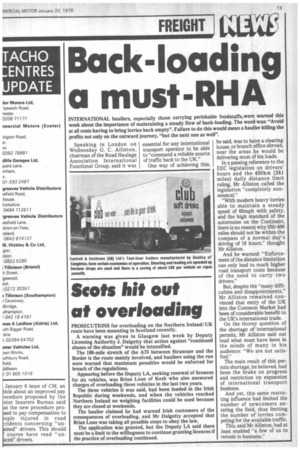Uba Back-loading a must-RHA
Page 21

If you've noticed an error in this article please click here to report it so we can fix it.
INTERNATIONAL hauliers, especially those carrying perishable foodstuffs,were warned this week about the importance of maintaining a steady flow of back-loading. The word was: "Avoid at all costs having to bring lorries back empty". Failure to do this would mean a haulier killing the profits not only on the outward journey, "but the next one as well".
Speaking in London on Wednesday G. C. Alliston, chairman of the Road Haulage Association International Functional Group, said it was essential for any international transport operator to be able to "command a reliable source of traffic back to the UK."
One way of achieving this, he said, was to have a clearing house, or branch office abroad, near the areas he would be delivering most of his loads.
In a passing reference to the EEC legislation on drivers' hours and the 450km (281 miles) daily distance limit ruling, Mr Alliston called the legislation "completely nonsensical."
"With modern heavy lorries able to maintain a steady speed of 60mph with safety, and the high standard of the autoroutes on the Continent, there is no reason why 350/400 miles should not be within the compass of a normal day's driving of 10 hours," thought Mr Alliston.
And he warned: "Enforcement of the distance limitation can only lead to much higher road transport costs because of the need to carry two drivers."
But, despite the "many difficulties and disappointments," Mr Alliston remained convinced that entry of the UK into the Common Market had been of considerable benefit to the UK's international trade.
On the thorny question of the shortage of international permits, Mr Alliston said out loud what must have been in the minds of many in his audience: "We are not satisfied."
The main result of this permits shortage, he believed, had been the brake on progress and restriction on expansion of international transport business.
And yet, this same restricting influence had limited the number of newcomers entering the field, thus limiting the number of lorries competing for the available traffic.
This, said Mr Alliston, had at least enabled "a few of us to remain in business."
















































































































